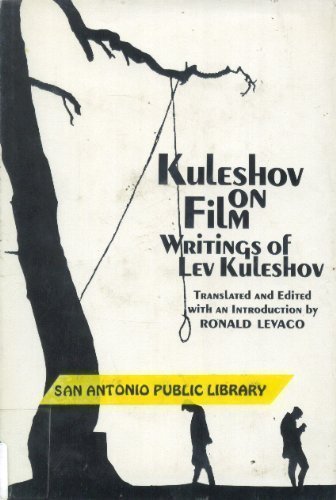Kuleshov on Film: Writings by Lev Kuleshov book
Par salmons michael le lundi, juillet 18 2016, 05:47 - Lien permanent
Kuleshov on Film: Writings by Lev Kuleshov by Lev Vladimirovich Kuleshov, Ronald Levaco


Download eBook
Kuleshov on Film: Writings by Lev Kuleshov Lev Vladimirovich Kuleshov, Ronald Levaco ebook
Page: 121
Publisher: Univ of California Pr
Format: pdf
ISBN: 0520026594, 9780520026599
The following list of a baker's dozen titles, limited to one film per director, is consciously meant to underscore the era's diversity. Lev kuleshov was among the very first to theorise about the relatively young medium of the cinema in the 1920s. Like modern poets who learned their craft writing sonnets, the discipline was good for directors who carried those techniques into the sound era. The Kuleshov Effect and his film. Kuleshov and the Juxtaposition of Shots. The Kuleshov effect is one of the great discoveries in the history of cinema, Lev Kuleshov a Soviet film maker was one of the first to dissect and analyze the emotion effect of visual montage and juxtaposition. This entry was posted in Cinematic language, Filmmakers and tagged chaplin, degas, dovzhenko, eisenstein, film theory, filmmaking, lev kuleshov, pudovkin, pushkin, urusevsky by Digifruitella. Lev Vladimirovich Kuleshov was a scientist and founder of the Moscow School of Cinema in 1919, the world's oldest film school. In 1918 he conducted his famous experiment (below) using a single shot of the silent film actor Ivan Mozzhukhin's face looking at something off-camera. During the 1920's Lev Kuleshov was among the first to theorise that the essence of cinema was the editing of a film, the juxtaposition of one shot to another. Russian filmmaker Lev Kuleshov demonstrated the montage effect in the 1910s and 1920s. This was a time when the art form was extremely new, but audiences were already going nuts for stars. In the 1910s and 1920s, Lev Kuleshov was a famous Russian filmmaker curious about how audiences responded to film. Nevertheless, Hitch didn't learn those lessons overnight. Russian cinema came of age with the 1917 revolution. In the early 20th century, Russian filmmaker and theorist Lev Kuleshov discovered that a single shot of an actor with an ambiguous expression on his face could convey a multitude of very distinct meanings in the mind of the viewer, depending on the nature of the shot immediately preceding it. The Kuleshov Effect is a film editing technique created by Lev Kuleshov. West in the Land of the Bolsheviks (Kuleshov, 1924).